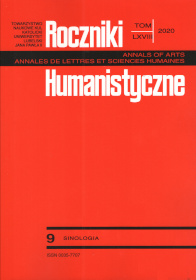Reply to the Review by Prof. Marcin Jacoby
References
Ames, Roger, i Henry Rosemont, Jr. Confucian Role Ethics A Moral Vision for the 21st Century?, V&R Academic, 2016.
Konfucjusz. Analekta. Tłum. i oprac. Katarzyna Pejda, Wydawnictwa Uniwersytetu Warszawskiego.
Chai, David. „Nothingness and Selfhood in the Zhuangzi”. The Bloomsbury Research Handbook of Early Chinese Ethics and Political Philosophy, red. Alexus McLeod, Bloomsbury Academic 2019, ss. 133-154
Coutinho, Steve. Zhuangzi and Early Chinese Philosphy. Vagueness, Transformation and Paradox. Routledge, 2004.
Defoort, Carine. „Is There Such a Thing as Chinese Philosophy? Arguments of an Implicit Debate. Philosophy East and West, vol. 51, no. 3, 2001, ss. 393-413, www.jstor.org/stable/ 1399849. Dostęp 21.04.2020.
Gier, Nicholas F. „The Dancing Ru: A Confucian Aesthetics of Virtue”. Philosophy East and West, vol. 51, no. 2, 2001, ss. 280-305, www.jstor.org/stable/1400004. Dostęp 21.04.2020.
Goldin, Paul. „Non-deductive Argumentation in Early Chinese Philosophy”. Between History and Philosophy: Anecdotes in Early China, red. Paul van Els i Sarah A. Queen, Sunny Press, University of New York, 2017, ss. 41-62.
Hansen, Chad. Language and Logic in Ancient China. University of Michigan, 1983.
Hansen, Chad. „Chinese Language, Chinese Philosophy, and ‘Truth’”. The Journal of Asian Studies, vol. 44, no. 3, 1985, ss. 491-519, doi: 10.2307/2056264.
Hansen, Chad. „Chinese Ideographs and Western Ideas”. The Journal of Asian Studies, vol. 52, no. 2, 1993, ss. 373-399, doi: 10.2307/2059652.
Hwang, Kwang-Kuo. „Filial piety and loyalty: Two types of social identification in Confucianism”. Asian Journal of Social Psychology, vol. 2, no. 1, 1999, ss. 163-183, doi: 10.1111/ 1467-839X.00031.
Ivanhoe, Philip J. „Understanding Traditional Chinese Philosophical Texts”. International Philosophical Quarterly, vol. 52, no. 3, 2012, ss. 303-314, doi: 10.5840/ipq201252335.
Kowalski, Mirosław, i Daniel Falcman. Świadomość aksjologiczna i podmiotowość etyczna. Analizy i impresje. Oficyna Wydawnicza IMPULS, 2011.
Lai, Karyn. Learning form Chinese Philosophies: ethics of Independent and contextualised self. Ashgate Publishing Company, 2006.
Liu, JeeLoo. „Converting Chinese Philosophy into the Analytic Context”. Invited speaker by the Shalem Center, The Shalem Center, Jerusalem, Israel, 2009, citeseerx.ist.psu.edu/viewdoc/ download?doi=10.1.1.584.4166&rep=rep1&type=pdf. Dostęp 20.04.2020.
Markus, Hazel Rose, i Shinobu Kitayama. „Culture and the self: Implications for cognition, emotion, and motivation”. Psychological Review, vol. 98, no. 2, 1991, ss. 224-253, doi: 10.1037/ 0033-295X.98.2.224.
Mattice, Sarah A. „On ‘Rectifying’ Rectifications: Reconsidering Zhengming in Light of Confucian Role Ethics.” Asian Philosophy, vol. 20, no. 3, 2010, ss. 247-260, doi: 10.1080/095 52367.2010.511025.
Mattice, Sarah. „Artistry as Methodology: Aestheticc Experience and Chinese Philosophy”. Philosophy Compass, vol. 8, no. 3, 2013, ss. 199-209, doi: 10.1111/phc3.12014
Ossowska, Maria. Podstawy nauki o moralności. Państwowe Wydawnictwo Naukowe, 1966.
Ossowska, Maria. Motywy Postępowania. Z zagadnień moralności. Książka i Wiedza, 2002.
Pejda, Katarzyna. „Reintepretacja najważniejszych pojęć Dialogów Konfucjańskich. Klasterowy koncept ren”. Konfucjanizm i jego współczesne interpretacje, red. Roman Sławiński, Wydawnictwo Naukowe Askon, 2013, ss. 64-73.
Pejda, Katarzyna. „Konfucjuszowskie doświadczenie sacrum – analiza wybranych pojęć w tekście Analektów”. Roczniki Humanistyczne, t. 63, z. 9, 2015, ss. 121-137, doi: 10.18290/rh. 2015.63.9-8.
Pejda, Katarzyna. „Junzi 君子 jako wzór osobowy przedstawiony w Analektach i etos z tym wzorem związany”. Roczniki Humanistyczne, t. 63, z. 9, 2015, ss. 101-119, doi: 10.18290/rh. 2015.63.9-7.
Pejda, Katarzyna. „Samodoskonalenie xiu shen 修身–naśladownictwo wzoru osobowego junzi 君子 w Analektach”. Roczniki Humanistyczne, t. 64, z. 9, 2016, ss. 91-118, doi: 10.18290/ rh.2016.64.9-5.
Quanxing, Xu, i Huang Deyuan. „Theory on the Cultivation of Cognitive Subjects in Chinese Philosophy”. Frontiers of Philosophy in China, vol. 3, no. 1, 2008, ss. 39-54, www.jstor.org/ stable/40343859. Dostęp 20.04.2020.
Rošker, Jana. „Intercultural Methodology in Researching Chinese Philosophy”, www. researchgate. net/publication/287814797_Intercultural_Methodology_in_Researching_Chinese_Philosophy. Dostęp 01.04.2020.
Rošker, Jana. „Chinese Philosophy – Fact or Fiction”, www.academia.edu/34920216/CHINESE_ PHILOSOPHY_-FACT_OR_FICTION. Dostęp 01.04.2020.
Zawadzki, Jarosław. Rozważania (Dialogi konfucjańskie). Opracowanie: Uczniowie Konfucjusza 孑L子門人. Przetłumaczył z języka chińskiego Jarek Zawadzki 沙寧. Przekład dramaturgiczny wierszem 詩詞話劇式的波蘭語譯文, CreateSpace, 2012.
Zhuangzi. Prawdziwa Księga Południowego Kwiatu. Tłum. Marcin Jacoby, Iskry, 2009.
Copyright (c) 2020 Roczniki Humanistyczne

This work is licensed under a Creative Commons Attribution-NonCommercial-NoDerivatives 4.0 International License.





